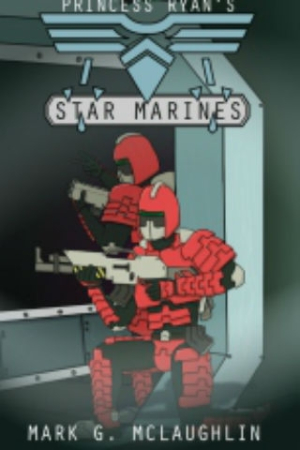Princess Ryan's Star Marines
In Princess Ryan’s Star Marines, the titular military force is determined to rescue their charge, Princess Ryan, from the rebellious Grand Republic’s clutches and return her to the Holy and Universal Galactic Empire. Viceroy Dar Yamaguchi has kidnapped young Ryan in order to irritate the Empire into starting another war—several decades after the Empire’s civil war from which the Grand Republic was born. The main problem for both sides is a lack of full military preparedness, and not enough time to get their forces upgraded and operating before the shooting starts. Additionally, some of the naval officers would prefer not to go to war. Behind these scenes is a plot to overthrow the Empire from within, with spies on both sides (some of whom may be double agents) muddying the diplomatic waters to attain their ultimate goal.
Game designer and freelance writer Mark McLaughlin’s first novel is packed to the rafters with old-fashioned space opera (and lots of new bits) that throws caution to the wind and replaces it with very amusing prose, without losing the reins of the story.
Humor is difficult to write well; attempting science fiction that is funny and retains its genre conventions is an easy way to fall flat on one’s face as a writer. Science fiction readers will certainly recognize the intended humor that’s generously salted throughout the book. General readers can also enjoy the novel; its Austenesque noncombat scenes and dialogue, as well as the depth to which science fiction has permeated popular culture in movies and television programs, should make Princess Ryan’s Star Marines easily comprehensible.
This is a family-supported novel as well: the cover art was drawn by his son Campbell, and the inspiration for the board games and this novel came from his daughter, Ryan.
McLaughlin pokes gentle fun at such science fiction cliches as extensive character numbers requiring a Dramatis Personae (to keep track of who’s who and where), the naval structure of spaceship terminology and operation, a distinct lack of democratic government, and text additions to chapter headings. The latter often are quotes from “real” books or from documents some of the characters have written, and can become pretentious if overused. McLaughlin has made these quotable quotes part and parcel of the humorous atmosphere he’s created, which may send the genre’s cognoscenti into fits of chuckling.
Humor in fiction demands that the author maintain the tone that’s established on the first page right through to the end. McLaughlin hits all the right buttons in the correct sequence to give readers a tale that will likely cause more than a few grins and chuckles. Recommended.
Reviewed by
J. G. Stinson
Disclosure: This article is not an endorsement, but a review. The publisher of this book provided free copies of the book and paid a small fee to have their book reviewed by a professional reviewer. Foreword Reviews and Clarion Reviews make no guarantee that the publisher will receive a positive review. Foreword Magazine, Inc. is disclosing this in accordance with the Federal Trade Commission’s 16 CFR, Part 255.

